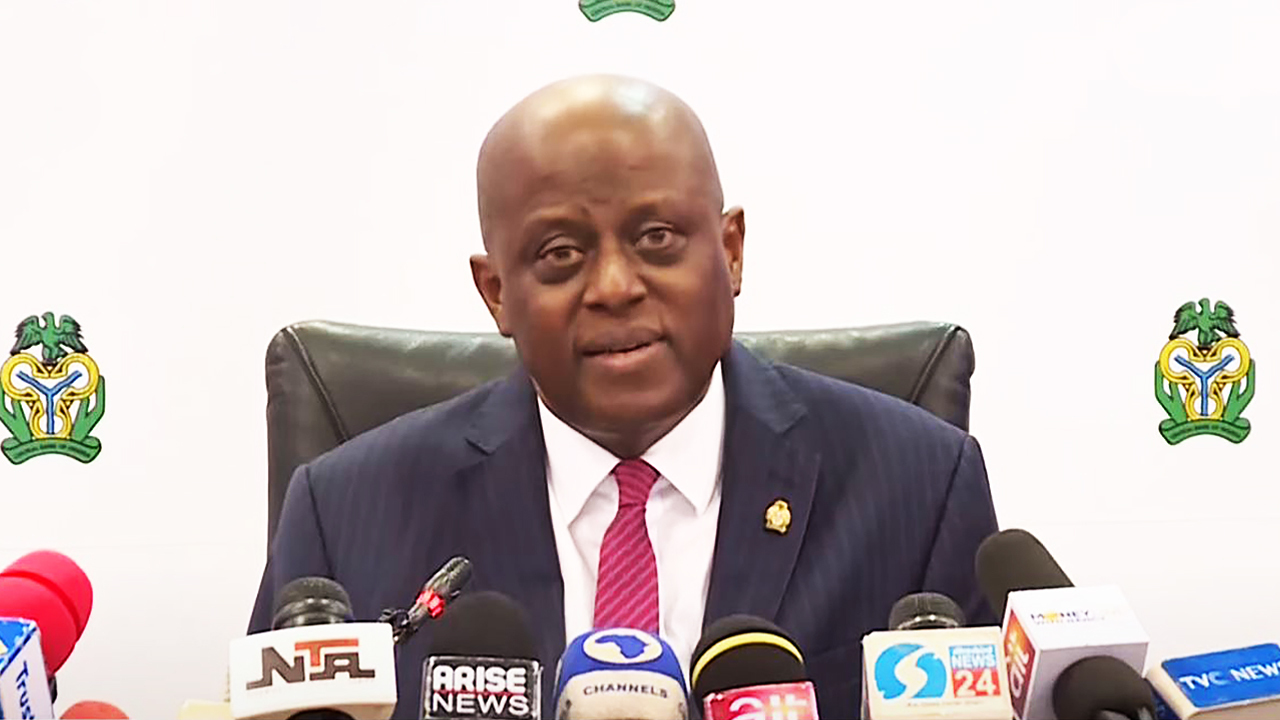General
Court Gives SERAP Power to Stop Double Pay for Saraki, Others

By Modupe Gbadeyanka
The Socio-Economic Rights and Accountability Project (SERAP) has been given the go ahead to stop former governors and now serving senators and ministers from receiving double pay and life pensions from government.
Ruling last Friday, Justice Oluremi Oguntoyinbo of the Federal High Court sitting in Lagos held that SERAP has “sufficient interest to bring its suit to stop the payment and also seek recovery of over N40 billion of public funds unduly received by these public officers.”
In 2017, the group filed a suit to compel the Attorney-General of the Federation and Minister of Justice, Mr Abubakar Malami (SAN), to “challenge the legality of states’ laws that allow former governors who are now senators and ministers to enjoy governors’ emoluments while drawing normal salaries and allowances in their new political offices and to identify those involved and seek full recovery of public funds from them.”
While granting leave in the suit number FHC/L/CS/1497/17, Justice Oguntoyinbo said, “SERAP cannot be considered a meddlesome interloper or busybody in seeking to stop double pay and life pensions for former governors”, emphasising that all that mattered was for SERAP to show “sufficient interest in the application for leave to apply for an order of mandamus.”
Extensively reviewing and relying on Order 34, Rules 1(1) a, 2, Rule 3 (1) and (2) of the Federal High Court (Civil Procedure) Rules 2009, and quoting from several Supreme Court Judgments, Justice Oguntoyinbo insisted that, “the court shall not grant leave in mandamus application unless it considers that the applicant has sufficient interest in the matter to which the application relates.”
While stating that she was “mindful of the fact that in an application of this nature, the judge should not delve into the substance of the main issue”, she however ruled that “having reviewed the papers filed by SERAP, the court is satisfied that the organization has met the criteria set by the Rules of the Court, and as such does not consider SERAP a meddlesome interloper.”
Justice Oguntoyinbo’s ruling followed the hearing of an argument in court on exparte application by SERAP counsel Timothy Adewale. The case is adjourned to 22 March 2018 for the hearing of arguments on the motion on notice.
It would be recalled that SERAP had on 4 October, 2017 filed the suit at the Federal High Court in Ikoyi, praying the court to compel “the Attorney-General of the Federation and Minister of Justice Mr. Abubakar Malami, SAN to use his position as a defender of public interest to institute legal actions to stop former governors from enjoying emoluments while drawing normal salaries and allowances in their positions as senators and ministers.”
The suit read in part: “Public function should be exercised in the public interest. Double emoluments promote private self-interest or self-dealing. By signing double emoluments laws, which they knew or ought to know that they would be beneficiaries, these former governors have abused their entrusted positions, and thereby obtained an undue advantage, contrary to article 19 of the UN Convention against Corruption to which Nigeria is a state party.”
“Senators and ministers should not be receiving salaries and pensions running into billions of naira from states that are currently unwilling or unable to pay their workers’ salaries and pensioners’ entitlements. National and international laws implicitly forbid public officials entrusted with public resources from granting to themselves emoluments for life while serving in other public offices including as senators and ministers.”
“Taking advantage of entrusted public offices and positions to enact laws to grant double emoluments and large severance benefits to serving public officials amounts to not only an abuse of office but also incorrect, dishonourable and improper performance of public functions, as per the provisions of paragraph 2 of article 8 of the United Nations Convention Against Corruption.”
It would be recalled that following SERAP’s letter to Mr Malami, Senate President Dr Bukola Saraki last year told the News Agency of Nigeria (NAN) Forum in Abuja that he wrote a letter to the state government to stop the payment of the pension “the moment I saw that SERAP allegation.” He said, “No, I’m not collecting pension; the moment I saw that allegation, I wrote to my state to stop my pension.”
So far, Dr Kayode Fayemi Minister of Mines and Steel Development and his counterparts in the Ministry of Labour and Employment, Senator Chris Ngige, and Minister of Power, Works and Housing Babatunde Fashola have denied ever receiving double payments and retirement benefits as former governors in addition to other roles in public office.
SERAP’s letter to Malami read in part: “According to our information, those who reportedly receive double emoluments and large severance benefits from their states include: Rabiu Musa Kwankwaso (Kano); Kabiru Gaya (Kano); Godswill Akpabio (Akwa Ibom); Theodore Orji (Abia); Abdullahi Adamu (Nasarawa); Sam Egwu (Ebonyi); Shaaba Lafiagi (Kwara); Joshua Dariye (Plateau), and Jonah Jang (Plateau). Others include: Ahmed Sani Yarima (Zamfara); Danjuma Goje (Gombe); Bukar Abba Ibrahim (Yobe); Adamu Aliero (Kebbi); George Akume (Benue); and Rotimi Amaechi (Rivers).”
“Under the Lagos Pension Law a former governor will enjoy the following benefits for life: Two houses, one in Lagos and another in Abuja estimated to cost between N500m and N700m. Others are six brand new cars every three years; furniture allowance of 300 percent of annual salary every two years, and a close to N2.5m as pension (about N30m pension annually); free medicals including for his immediate families; 10 percent house maintenance; 30 percent car maintenance; 10 percent entertainment; 20 percent utility; and several domestic staff.”
“In Rivers, state law provides 100 percent of annual basic salaries for ex-governor and deputy, one residential house for former governor anywhere of his choice in Nigeria; one residential house anywhere in Rivers for the deputy, three cars for the ex-governor every four years; two cars for the deputy every four years; 300 percent of annual basic salary every four years for furniture; 10 percent of annual basic salary for house maintenance.”
“In Akwa Ibom, state law provides for N200m annual pay to ex governors, deputies; pension for life; a new official car and utility-vehicle every four years; one personal aide and provision of adequate security; a cook, chauffeurs and security guards for the governor at a sum not exceeding N5m per month and N2.5m for the deputy governor; free medical services for governor and spouse totaling N100m for the governor per annum and N50m for the deputy governor; a five-bedroom mansion in Abuja and Akwa Ibom; and allowance of 300 percent of annual basic salary for the deputy governor; 300 percent of annual basic salary every four years and severance gratuity.”
“Similarly, the Kano State Pension Rights of Governor and Deputy Governor Law 2007 provides for 100 percent of annual basic salaries for former governor and deputy; furnished and equipped office; a 6-bedroom house; well-furnished 4-bedroom for deputy, plus an office; free medical treatment along with immediate families within and outside Nigeria where necessary; two drivers; and a provision for a 30- day vacation within and outside Nigeria.”
“In Gombe State, there is N300 million executive pension benefits for the ex-governors. In Kwara State, the 2010 law gives a former governor two cars and a security car replaceable every three years; a well-furnished 5-bedroom duplex; 300 per cent of his salary as furniture allowance; five personal staff; three State Security Services; free medical care for the governor and the deputy; 30 percent of salary for car maintenance; 20 per cent for utility; 10 percent for entertainment; 10 per cent for house maintenance.”
“In Zamfara State, former governors receive pension for life; two personal staff; two vehicles replaceable every four years; two drivers, free medical for the former governors and deputies and their immediate families in Nigeria or abroad; a 4-bedroom house in Zamfara and an office; free telephone and 30 days paid vacation outside Nigeria. In Sokoto State, former governors and deputy governors are to receive N200m and N180m respectively being monetization for other entitlements which include domestic aides, residence and vehicles that could be renewed after every four years.”
“The abolition of such laws therefore is a necessary first step towards delivering on the constitutional promise of equal protection and equal benefit of the law for a distressingly large number of Nigerians. Otherwise, public officials will remain seriously out of touch with a major source of poverty and discrimination in the country.”
General
INEC Shifts 2027 Presidential, N’Assembly Elections to January 16

By Adedapo Adesanya
Nigeria will hold next year’s presidential and National Assembly elections a month earlier than planned, after the Independent National Electoral Commission (INEC) revised the polling schedule.
The elections will be held on January 16, instead of the previously announced date of February 20, INEC said in an X post, signed by Mr Mohammed Kudu Haruna, National Commissioner and Chairman, Information and Voter Education Committee.
There were also changes to the Governorship and State Houses of Assembly elections initially fixed for Saturday, March 6 2027, in line with the Electoral Act, 2022, have now been moved to Saturday, February 6, 2027.
The electoral commission said the changes were caused by the enactment of the Electoral Act, 2026 and the repeal of the Electoral Act, 2022, which introduced adjustments to statutory timelines governing pre-election and electoral activities.
“The Commission reviewed and realigned the schedule to ensure compliance with the new legal framework,” it said.
INEC said party primaries (including resolution of disputes) will commence on April 23, 2026 and end on May 30, 2026, after which Presidential and National Assembly campaigns will begin on August 19, 2026, while Governorship and State Houses of Assembly campaigns will begin on September 9, 2026.
It noted that campaigns will end 24 hours before Election Day, and political parties have been advised to strictly adhere to the timelines.
INEC also stated it will enforce compliance with the law.
The electoral body also rescheduled the Osun Governorship election which was earlier scheduled for Saturday, August 8 2026, by a week to Saturday, August 15, 2026.
INEC noted that some activities regarding the Ekiti and Osun governorship elections have already been conducted, and the remaining activities will be implemented in accordance with the Electoral Act, 2026.
Speaking at a news briefing in Abuja two weeks ago, the chairman of INEC, Mr Joash Amupitan, expressed the readiness of the commission to conduct the polls next year.
The timetable issued by the organisation for the polls at the time came when the federal parliament had yet to transmit the amended electoral bill to President Bola Tinubu for assent.
Later that week, the Senate passed the electoral bill, reducing the notice of elections from 360 days to 180 days, while the transmission of results was mandated with a proviso.
General
NIMASA Rallies Stakeholders’ to Develop National Action Plan

By Adedapo Adesanya
The Nigerian Maritime Administration and Safety Agency (NIMASA) has pledged its commitment to provide the regulatory leadership, technical coordination, and stakeholder engagement required to successfully develop and implement a robust National Action Plan on maritime decarbonization in Nigeria.
The Director General of the agency, Mr Dayo Mobereola, made this known during the National Stakeholders’ workshop on the development of a National Maritime Decarbonization Action Plan, further describing the workshop as a critical step in actualising the Federal Government’s blue economy and climate objectives.
Represented by the Executive Director, Operations, Mr Fatai Taiye Adeyemi, the NIMASA DG underscored the significance of the IMO GreenVoyage2050 Project, a technical cooperation initiative /designed to support developing countries in implementing the IMO GHG Strategy.
According to him, the National Action Plan being developed will reflect national realities, leverage existing capacities, address identified gaps, and align with broader economic and environmental priorities of the federal government.
Mr Mobereola stressed that “this transition is not merely about compliance with international obligations, it is about safeguarding our marine environment, protecting public health, strengthening the blue economy, and ensuring that our maritime industry remains competitive and future-ready”, the DG said.
Also speaking at the event was the Technical Manager of the IMO GreenVoyage2050 Project, Ms Astrid Dispert, who highlighted that the overarching objective of the initiative is to advance a coherent and globally aligned regulatory framework to accelerate maritime decarbonization.
She also emphasised that NIMASA plays a pivotal role in driving the project at the national level.
The IMO GreenVoyage2050 Project provides technical expertise and institutional support to assist countries in developing and implementing National Action Plans that promote sustainable shipping practices, encourage investment in clean technologies, and strengthen capacity for long-term emissions reduction.
Through this collaboration, the federal government is advancing deliberate steps towards maritime decarbonization, reinforcing its commitment to global climate goals and ensuring a cleaner, greener, and more sustainable future for the sector.
General
BPP Mandates Digital Submission for MDAs From March 1

By Adedapo Adesanya
The Bureau of Public Procurement (BPP) has directed all Ministries, Departments and Agencies (MDAs) to comply with its digital submission process effective March 1.
The directive was contained in a circular signed by the Director-General of the Bureau, Mr Adebowale Adedokun, noting that the move was part of the bureau’s commitment to digital transformation and paperless governance.
It explained that the transition followed an earlier circular of Aug. 4, 2025, which introduced electronic submission procedures.
According to the bureau, it has successfully moved from physical filings to a dedicated e-mail service for document submissions and is now advancing to a more robust and integrated system.
The circular announced the inauguration of the BPP Digital Submission Portal, a web-based platform designed to enable MDAs submit procurement-related documents directly to the Bureau.
It stated that the automated platform would streamline the submission process, enhance transparency and ensure accelerated tracking of procurement-related documents and petitions.
“With effect from March 1, all MDAs will be required to use the portal to submit requests for ‘No Objection’ Certificates, approvals for ‘No Objection’ for special procurements, clarifications and status updates on submissions,” the bureau said.
It added that the portal would be hosted on the Bureau’s official website and would become fully operational from the effective date.
The bureau warned that physical submissions or manual hand-deliveries would no longer be prioritised and would eventually be rejected following the full transition to the digital platform.
It urged accounting officers to brief their procurement departments and ICT units on the development to ensure seamless processing of procurement activities from March 1.
It further advised MDAs to contact the Bureau via its official email for information on the onboarding process and integration into the portal.
The bureau emphasised that full compliance by all MDAs was required to ensure a smooth transition and avoid delays in the implementation of the 2026 fiscal year procurement processes.
-

 Feature/OPED6 years ago
Feature/OPED6 years agoDavos was Different this year
-
Travel/Tourism10 years ago
Lagos Seals Western Lodge Hotel In Ikorodu
-

 Showbiz3 years ago
Showbiz3 years agoEstranged Lover Releases Videos of Empress Njamah Bathing
-

 Banking8 years ago
Banking8 years agoSort Codes of GTBank Branches in Nigeria
-

 Economy3 years ago
Economy3 years agoSubsidy Removal: CNG at N130 Per Litre Cheaper Than Petrol—IPMAN
-

 Banking3 years ago
Banking3 years agoSort Codes of UBA Branches in Nigeria
-

 Banking3 years ago
Banking3 years agoFirst Bank Announces Planned Downtime
-

 Sports3 years ago
Sports3 years agoHighest Paid Nigerian Footballer – How Much Do Nigerian Footballers Earn




















